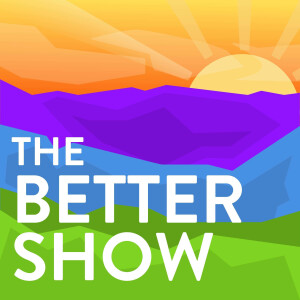
Celeste Headlee on Do Nothing: How to Break Away from Overworking, Overdoing, and Underliving
 2020-03-10
2020-03-10
Download
Right click and do "save link as"
Show NotesTo purchase Celeste’s new book visit https://amzn.to/2PSSZ4X2:45 — Ian welcomes back Celeste to The Better Show.4:14 — Why slowing down and learning to sometimes “do nothing” is a important to our individual health and well-being.8:20 — Ian asks whether the idea of overworking is a cultural phenomenon or if it is just a western trait.10:10 — We learn about the “hedonic treadmill” and how this adaptation of human psychology affects our behaviors towards work, money, and time.12:30 —Celeste shares the story of how she came to a turning point with her work-life balance and how being out of balance deeply affected her health and happiness.18:00 — How the things we do to save time end up costing us time in the long run.19:18 — How the invention of the steam engine completely transformed the way we think about (and value) time.21:21 — If we’ve adopted all these time saving techniques and technologies, why aren’t we working fewer hours each week compared to how we worked 50 years ago?22:54 — Celeste shares things we can do to begin to recapture our time and increase the quality of our lives.23:32 — Why digital communication tends not to save us time.26:20 — Ian asks whether we have to shun technology if we are going to recapture the quality of our lives.28:20 — How multitasking can actually do cognitive damage to your brain.31:11 — Why Celeste makes it a point to throw more parties.32:00 — How the changes that Celeste made in her life really constituted a lifestyle change and how she introduced the change with her friends.34:00—Are we obsessed with researching decisions to death at the expense of actually making the decision?39:50 — The one thing that Celeste recommends people start with in order to make progress on this aspect of their life: do a time audit to see how you are REALLY spending your time.43:01 — Ian asks Darren and March to share their impressions of the interview with Celeste and Darren draws a parallel between Celeste’s concept of “doing nothing” and the Slow Food Movement.44:12 — March reflects on the difference between the tool and the implementation of the tool.47:20 — Ian reflects on how he wants more meaning and intention in how he spends his time.49:16 — Darren shares how Celeste’s observation of the hedonic treadmill seemed, to him, like a very deep truth about the human condition.50:05 — March offers the suggestion of a well-being audit to get a sense for what things in life cause you happiness and unhappiness.52:14 — Ian shares how Celeste’s insights on the history were helpful in giving him an idea of how different generations have different perspectives on their values.55:22 — March reflects on the value of questioning our cultural assumptions about time equaling money.59:47 — The team ends on a note of optimism about the future and our ability to use Celeste’s observations to improve our future.Mentions📖 Book: Do Nothing by Celeste Headlee
view more
More Episodes
Relaunch Teaser - We're coming back!
 2021-05-17
2021-05-17
 2021-05-17
2021-05-17
Better Coffee: Part 2
 2020-09-11
2020-09-11
 2020-09-11
2020-09-11
Better Coffee Part 1
 2020-08-21
2020-08-21
 2020-08-21
2020-08-21
Starting a Garden with Carmen Johnston
 2020-08-04
2020-08-04
 2020-08-04
2020-08-04
The Power of Music
 2020-07-15
2020-07-15
 2020-07-15
2020-07-15
Andrew Grant-Thomas: EmbraceRace
 2020-07-07
2020-07-07
 2020-07-07
2020-07-07
Better Pet Adoption: Part 2
 2020-06-23
2020-06-23
 2020-06-23
2020-06-23
Better Pet Adoption: Part 1
 2020-06-16
2020-06-16
 2020-06-16
2020-06-16
Book Review: Tiny Habits
 2020-06-02
2020-06-02
 2020-06-02
2020-06-02
Better Recovery Days
 2020-05-26
2020-05-26
 2020-05-26
2020-05-26
Better Video Conferencing Tips: Part 2
 2020-05-20
2020-05-20
 2020-05-20
2020-05-20
Better Video Conferencing Tips: Part 1
 2020-05-12
2020-05-12
 2020-05-12
2020-05-12
Things We're Grateful For Right Now
 2020-05-05
2020-05-05
 2020-05-05
2020-05-05
Things we've learned during COVID-19
 2020-04-28
2020-04-28
 2020-04-28
2020-04-28
Interview with Kevin Hancock
 2020-04-21
2020-04-21
 2020-04-21
2020-04-21
Our Favorite YouTube Channels
 2020-04-14
2020-04-14
 2020-04-14
2020-04-14
012345678910111213141516171819
Create your
podcast in
minutes
- Full-featured podcast site
- Unlimited storage and bandwidth
- Comprehensive podcast stats
- Distribute to Apple Podcasts, Spotify, and more
- Make money with your podcast
It is Free
- Privacy Policy
- Cookie Policy
- Terms of Use
- Consent Preferences
- Copyright © 2015-2024 Podbean.com





